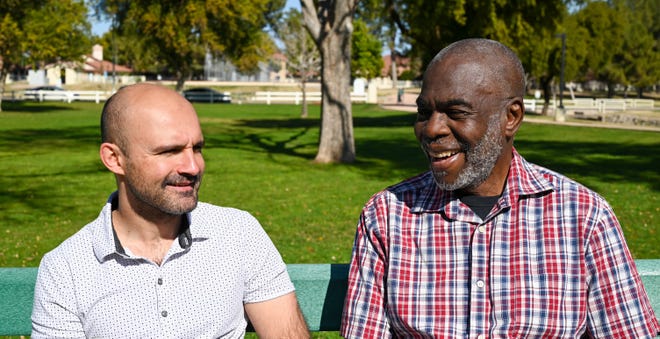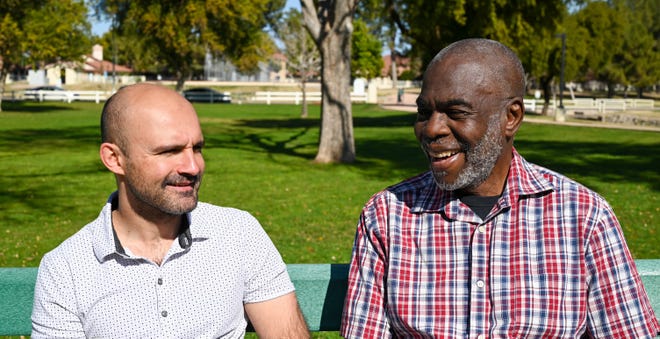
Nick Kehagias was the only state champion wrestler Robert Shegog coached in his Phoenix North High School tenure that ran from 1988 until his retirement in 2006.
They maintained a friendship since that 2000 celebration on the mat, after he won the 112-pound class title. As the years passed by, Kehagias, now an anesthesiologist who lives in Chandler, got to know his mentor like so few had.
Now 22 years later, after much prodding from Kehagias, they are telling the story that Shegog was too afraid to tell his wrestlers: That he is gay. That he was diagnosed with HIV in 1986. That he lost two partners to AIDS, along with other close friends. That he survived his own brushes with death.
In Shegog’s autobiography, co-written by Kehagias, “Wrestling With The Truth,” which was self-published and released in April on Amazon, Shegog reveals the “lie” he lived with, fearing his passion to teach and coach would be taken away if the school knew the truth.
Late in the book, Shegog, 70, says, “I don’t worry anymore about what anyone thinks about my sexuality, and I talk openly about it. Prejudice still exists, and I don’t force my views upon anyone. I have noticed less bias over the decades, so I am optimistically hopeful. Everyone has a past and being able to persevere and bloom despite difficult times is what matters.”
Kehagias’ best memories stem from high school wrestling. At 103 pounds, he won one match at state his sophomore year, placed second his junior year and won state his senior year.
“We were a scholar-athlete team, we won for Arizona two years in a row, and largely because of Coach Shegog,” Kehagias said. “Wrestling is important but if grades aren’t in order, you can’t do anything.”
For 10 years, Kahagias said he tried to get Shegog to write his autobiography. Once COVID hit in 2020, he pushed Shegog that this was the perfect time to do it while things were on lockdown. Shegog was a volunteer coach in the Prescott area and was a substitute teacher before COVID.
He agreed. They sat down for 20 hours worth of recorded interviews, and Kehagian penned the coach’s story. Kehagias said he interviewed about 100 other people who are in the book.

“If people knew that he was gay, there was a good chance he wouldn’t have been able to teach,” Kehagias said. “If they knew he had HIV, definitely he was done. Wrestling coach, absolutely no way.”
In the book’s forward, Kehagias writes, “He knew coaching wrestling wouldn’t have been an option had people learned the truth about him in the 1980s, 1990s, and possibly in the 2000s. He lived a lie and did so for the sake of his students. For my sake. I recall my 14-year-old self as a freshman in high school and wonder, ‘Would I have been mature to join the wrestling team if I knew the truth about my coach?’ It brings tears to my eyes because I know there’s a good chance that I would never had wrestled had I known. I would have missed on all the life lessons, so much character building, and who knows what kind of life would have resulted.”
From wrestling practice to the hospital
Kehagias, whose wife designed the book’s cover, spent the next four years after high school wrestling at the University of Chicago, where he became an All-American at 125 pounds. While going through medical school, Kehagias’ wrestling passion remained strong, volunteering to help wrestling programs in the state.
There is no cure for HIV, which attacks the immune system. But treatments have advanced since the 1980s.
Faculty was educated at the time on how HIV can be transmitted through blood, unprotected sex and contaminated needles.
Shegog said the worst of his symptoms, bouts of pneumonia, usually came in the summers, when he wasn’t teaching and coaching. His partner would help him to the bathroom and change bed sheets that were soaked with sweat.
But he would have to come up with excuses on why he would be absent from the wrestling team at times, why he had lost so much weight.
In February 2002, North’s greatest season, winning every dual meet with a chance to make a good run at the state title, right at the start of regionals, Shegog lost his second partner in life to AIDS.
“Some of my wrestlers noticed I that I wasn’t at practice and I could not tell them why,” Shegog says in the book. “I was emotionally unavailable right when they needed me most.”
While his partners were sick, he still went to school and wrestling practice. He would go from wrestling practice to the hospital, where he would spend the night with his partner, then go back to school.
The youngest of four children raised by a single mom, wrestling gave Shegog an outlet growing up in Albion, Michigan. He wrestled at Olivet College, where he was good enough to end up in its sports hall of fame. He was the only Black teacher in 1974 at Hartland (Michigan) High, his first teaching job.
He worked through roadblocks, traveled to Los Angeles, where he was homeless for a while, before moving to Phoenix.
He worked in the physical education department. In the coaches’ room, Shegog said sometimes coaches would joke about gay people, and make negative comments.
“When that would happen, I would just get up and leave the room,” Shegog said in a phone interview. “I didn’t want to sit there and listen to the gay jokes. I don’t have anything against those people. But that’s sometimes was how coaches talked when they weren’t around kids.”
He found a confidante at North in Diane Escalante, who was a teacher there while Shegog was grappling with his life and needed someone to turn to.
“My English classroom was in a portable right next to the PE building,” Escalate said. “Robert would pop in every now and then and tell me something about what the wrestling team was doing.
“I also met his mom at some point. We just became friends.”
When the principal sent five teachers, including Escalante and Shegog, to a diversity workshop, they bonded.
On a break, Robert said to me, ‘You may have noticed I’ve been losing weight. I’m HIV positive.’ ” Escalante said. “All I could do was hug him. We talked. He mentioned some people on campus, if they knew he was gay, they would go after his job.”
‘I can get through that’
North was an International Baccalaureate (IB) school that attracted a cross-section of students to the Phoenix Union High School District school.
Escalante knew there were other teachers in the district who were gay and lived with the fear of being outed and attacked.
“We were fortunate to have the leadership we had on our campus,” Escalante said. “I think everybody who knew Robert were dedicated to protecting him and others like him.
“His being gay had nothing to do with the friendship. He was such a dedicated coach and a student-oriented teacher. It was easy to be his friend.
Shegog said he hopes the book inspires people to accept who they are.
He feels people have become more tolerant, but he realizes prejudice and walls remain.
“I would hope that people would learn just to be kind,” Shegog said. “And also to be aware of what you’re saying, because you never know who you’re around. I would hope young people, or someone in the same situation, (learn) that, ‘Hey, I can get through it.’ “
Shegog, who would find out-of-town tournaments in places such as Payson to take his team to wrestle in invitationals, recalls the moments that made wrestling special for his students. He got on one of his wrestlers for being four pounds over the weight limit. He asked him why he went out for wrestling.
“He said, ‘I went out for wrestling because I wanted to go out of town,’ ” Shegog said.
Seeing the simplest things bring joy to his wrestlers kept him motivated.
“Part of my motivation to staying alive was because I wanted North to be good in wrestling,” Shegog said. “Not knowing what my health status would be every year, my drive was to make every year a banner year.
“Be better than you think you can be. Do more than you think you can do. And if you can be a good wrestler in the process of doing that, it’s icing on the cake.”
To suggest human-interest story ideas and other news, reach Obert at richard.obert@arizonarepublic.com or 602-316-8827. Follow him on Twitter @azc_obert.
Support local journalism: Subscribe to azcentral.com today








